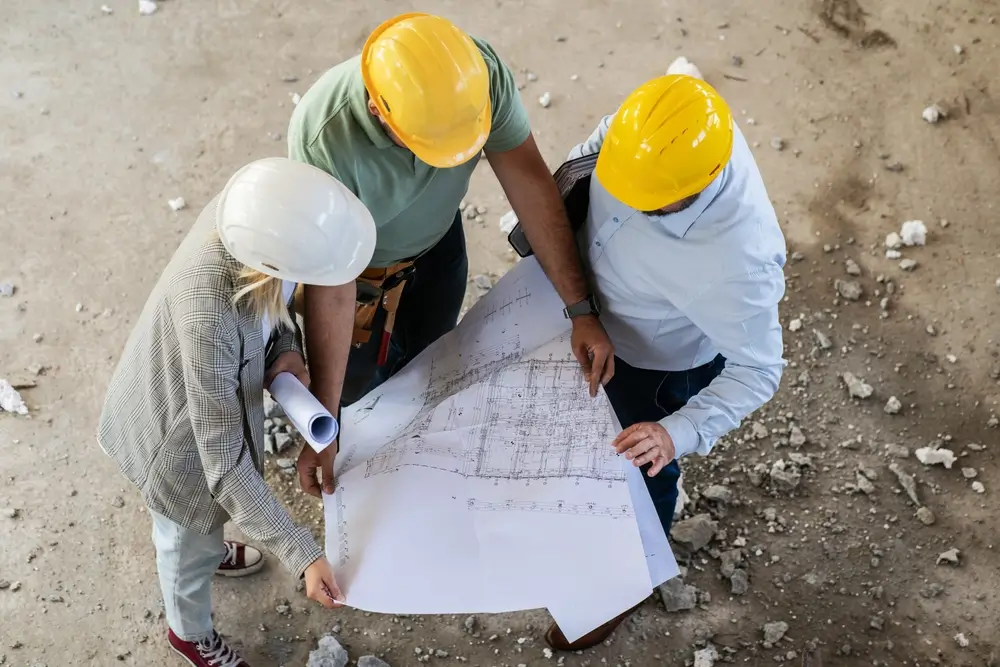Introduction
Construction management plays a crucial role in the successful execution of building projects, ensuring they are completed on time, within budget, and to the highest quality standards. It involves the systematic planning, coordination, and supervision of construction activities, making it an essential discipline in the construction industry. Whether it’s a residential development, commercial project, or large-scale infrastructure, effective construction management helps streamline operations and minimise risks.

A well-structured construction management process benefits all stakeholders, including contractors, developers, and project owners, by maintaining efficiency and ensuring compliance with safety regulations. Unlike general project management, which applies across various industries, construction management focuses specifically on the unique challenges of the built environment, such as site logistics, material procurement, and workforce coordination.
With the growing complexity of modern construction projects, the demand for skilled construction managers continues to rise. By implementing best practices and utilising advanced project management tools, professionals in this field help improve productivity and drive innovation in the industry. Understanding construction management is essential for anyone involved in the construction sector, as it provides the foundation for successful project delivery and long-term sustainability.
Definition of Construction Management
Construction management is the process of planning, coordinating, and overseeing construction projects from start to finish. It ensures that projects are completed on time, within budget, and according to specified quality standards. This specialised field involves managing resources, schedules, budgets, and risks while maintaining compliance with safety and legal requirements.
Key functions of construction management include project planning, cost estimation, contract administration, quality control, and workforce supervision. Construction managers act as the bridge between stakeholders, ensuring smooth communication between architects, engineers, contractors, and clients.
While construction management and project management share similarities, they differ in scope. Project management is a broader discipline applied across various industries, whereas construction management is specific to the building sector, focusing on site coordination, material procurement, and on-site problem-solving. Effective construction management enhances efficiency, minimises delays, and ensures successful project completion.
The Construction Management Process

Construction management follows a structured process to ensure a project is completed efficiently and successfully. The project lifecycle consists of three main phases: pre-construction, construction, and post-construction.
1. Pre-Construction Phase
- Planning and feasibility analysis to assess project viability.
- Budgeting and cost estimation to allocate financial resources.
- Design coordination between architects, engineers, and stakeholders.
- Permitting and legal approvals to meet regulatory requirements.
2. Construction Phase
- Supervision of on-site activities to ensure work aligns with plans.
- Scheduling and resource allocation to optimise workflow.
- Quality control and compliance with safety regulations.
- Communication between teams to prevent delays and resolve issues.
3. Post-Construction Phase
- Inspection and testing to confirm structural integrity.
- Handover of the completed project to the client.
- Maintenance planning and defect rectification if required.
Each phase plays a crucial role in ensuring construction projects are delivered on time, within budget, and to the highest standards.
Role of a Construction Manager
A construction manager is responsible for overseeing and coordinating all aspects of a construction project, ensuring it is completed on time, within budget, and to the required quality standards. They act as the link between clients, contractors, architects, and other stakeholders, ensuring smooth communication and efficient project execution.
Key Duties and Responsibilities
- Developing project plans, schedules, and budgets.
- Managing contracts, procurement, and material deliveries.
- Supervising on-site activities to ensure compliance with safety and quality standards.
- Coordinating with architects, engineers, and subcontractors.
- Resolving any project delays or construction challenges.
Essential Skills for a Construction Manager
- Strong leadership and decision-making abilities.
- Excellent communication and negotiation skills.
- Knowledge of construction techniques, regulations, and safety standards.
- Proficiency in project management software and scheduling tools.
Ensuring Efficiency and Quality
Construction managers implement quality control measures, optimise resource allocation, and enforce safety protocols. By maintaining effective scheduling and addressing issues proactively, they ensure projects run smoothly and meet the highest industry standards.
Key Principles of Construction Management
Effective construction management is built on several core principles that ensure projects are completed efficiently, safely, and within budget. These principles help maintain control over every stage of construction while minimising risks and maximising quality.
1. Cost Management and Budgeting
- Estimating project costs accurately to prevent financial overruns.
- Allocating resources efficiently to maximise value.
- Monitoring expenses throughout the project to stay within budget.
2. Time Management and Scheduling
- Creating detailed project timelines and milestones.
- Coordinating tasks to prevent delays and ensure smooth workflow.
- Using scheduling tools to track progress and make necessary adjustments.
3. Quality Assurance and Control
- Implementing strict quality control measures to meet project specifications.
- Conducting regular inspections and compliance checks.
- Ensuring the use of high-quality materials and skilled labour.
4. Safety and Compliance
- Adhering to workplace health and safety regulations.
- Providing proper training and protective equipment for workers.
- Minimising hazards and ensuring a safe working environment.
5. Risk Management
- Identifying potential risks such as delays, cost overruns, or material shortages.
- Developing contingency plans to address unforeseen issues.
- Regularly assessing and mitigating risks throughout the project.
By following these principles, construction managers can effectively oversee projects, ensuring they are completed successfully while maintaining quality, safety, and efficiency.
Construction Management Techniques and Tools

Effective construction management relies on various techniques and tools to streamline operations, improve efficiency, and ensure successful project completion. These methods help construction managers track progress, manage resources, and enhance communication among stakeholders.
1. Use of Construction Scheduling Software
Modern construction projects utilise scheduling software like Primavera P6 and Microsoft Project to create detailed timelines, allocate resources, and track deadlines. These tools help in identifying potential delays and optimising workflows.
2. Project Tracking Methods
Techniques such as the Critical Path Method (CPM) and Earned Value Management (EVM) help monitor project progress, compare planned vs. actual performance, and ensure cost control. Regular site inspections and progress reports also aid in maintaining transparency.
3. Communication and Documentation Strategies
Clear and structured communication is essential for smooth project execution. Digital collaboration platforms like Procore and Buildertrend allow real-time updates, while maintaining proper documentation helps in dispute resolution and regulatory compliance.
4. Lean Construction Principles
Lean construction focuses on reducing waste, maximising value, and improving workflow efficiency. Techniques such as Just-in-Time (JIT) material delivery and continuous improvement (Kaizen) enhance productivity and cost-effectiveness.
By leveraging these tools and techniques, construction managers can improve project efficiency, minimise risks, and ensure successful project delivery.
Types of Construction Management
Construction management varies depending on the type of project, with each category requiring specific expertise, techniques, and regulatory compliance. Below are the main types of construction management.
1. Residential Construction Management
This involves managing the construction of houses, apartments, and townhouses. It includes overseeing contractors, budgeting, and ensuring compliance with local building codes. Project managers focus on maintaining quality while meeting homeowner expectations and deadlines.
2. Commercial Construction Management
Commercial projects include office buildings, retail spaces, hotels, and shopping centres. These projects require efficient coordination between architects, engineers, and multiple stakeholders to ensure timely completion and adherence to safety regulations.
3. Infrastructure and Civil Construction Management
This covers large-scale public works such as roads, bridges, tunnels, railways, and water supply systems. Civil construction managers work closely with government agencies and contractors to ensure projects meet environmental, safety, and engineering standards.
4. Industrial Construction Management
Industrial projects involve factories, power plants, refineries, and manufacturing facilities. These complex projects require advanced knowledge of structural integrity, heavy machinery installation, and compliance with strict industry regulations.
Each type of construction management presents unique challenges, but all share the common goal of delivering high-quality, efficient, and sustainable construction solutions.
Challenges in Construction Management
Construction management involves handling complex projects, and various challenges can arise throughout the process. Effective management strategies help mitigate these obstacles, ensuring successful project completion.
Common Obstacles
- Project Delays – Caused by weather conditions, labour shortages, or permit approvals, leading to extended timelines.
- Budget Overruns – Unexpected costs due to material price fluctuations, design changes, or poor cost estimation.
- Supply Chain Issues – Delays in material procurement due to shortages, transportation disruptions, or supplier inefficiencies.
- Labour Management – Hiring skilled workers and maintaining productivity while ensuring workplace safety.
- Regulatory Compliance – Adhering to local building codes, environmental laws, and safety standards.
How Effective Management Overcomes These Challenges
- Proactive Planning – Developing contingency plans and risk assessments to anticipate issues.
- Efficient Scheduling – Using project management software to track progress and adjust timelines.
- Budget Control – Regular cost monitoring and financial forecasting to prevent overruns.
- Supplier Coordination – Establishing strong supplier relationships to ensure timely material delivery.
- Workforce Management – Providing training, safety protocols, and motivation to improve productivity.
By addressing these challenges with strategic planning and modern tools, construction managers ensure smoother project execution and higher overall efficiency.
Conclusion
Construction management is essential for ensuring projects are completed on time, within budget, and to high-quality standards. It plays a crucial role in streamlining operations, reducing risks, and enhancing efficiency across various construction sectors. With advancements in technology, such as Building Information Modelling (BIM) and automation, construction management is evolving to improve productivity and sustainability. The growing focus on eco-friendly practices and smart construction solutions further highlights its importance. As the industry continues to advance, skilled construction managers will remain vital in delivering successful, cost-effective, and sustainable projects that meet modern demands.
Explore more insights with Construct Guide — your trusted source for construction expertise. Learn More.
